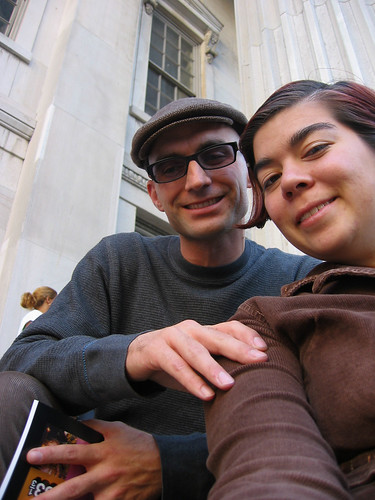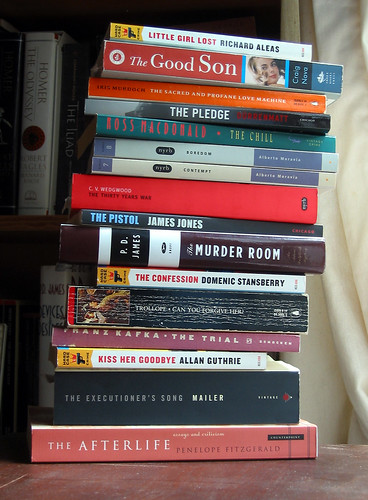
I've had
Van Morrison on the brain lately, because I've spent the past few weeks listening to him a lot and because
earlier this week Ed at the Dizzies pointed out a blog where Van fan Patrick Maginty
is writing about Van's 36 albums, from his least- to his most-favorite. Ed also sent me to
this cartoon (which is now my second-favorite music cartoon--my favorite is
here), which relates
cartoonist Mr. Saturnhead's dream that his great new job was to buy 44 Van Morrison albums--none of which exist in reality. The titles of the few that he displays in the comic are hilarious dead ringers for actual Van titles. Now I'm kind of surprised that I never tried imagining unmade Van albums in my days of being a superfan--when the password for my first e-mail account was G.Ivan1945. Trying to hit just the right note of lyricism verging on pretentiousness would have been a fun exercise.
As I waited for the train this morning, I was listening to Van's
"So Quiet in Here". A gorgeous, unexpectedly cool summer day was just getting underway, and I started thinking about how good Van is at writing about sheer joy; he's the only person I know who would write a song called
"Days Like This" that is about
good days. To my mind he's rivaled in pop music only by maybe
Prince and
Stevie Wonder (oh, and I suppose
Little Richard) in writing happy songs--which is harder than it would seem.
The opening of
Anna Karenina may have become a cliche, but at the base of
Tolstoy's statement about happy families is a real truth. Joy so often occurs in the absence of conflict, while art thrives on the creation, depiction, and resolution of conflict. To write about the ecstatic state outside the confines of mystical religion is difficult, and Van Morrison, over forty years, has frequently made it look easy.
My commuting companion the past few days has been Tolstoy's short early novel,
The Cossacks (1863), and as I settled back into it this morning, it occurred to me that Tolstoy, too, is one of the great depictors of surpassing joy in art. The thought came to me as I read the following scene, in which Olenin, a young Russian nobleman who has traded his dissipated Moscow life for service in the Caucasus, achieves a near mystical state of joy on a hunting trip deep in the forest:
This cloud of insects went so well with this wild, insanely lavish vegetation, with the forest's countless animals and birds, the dark verdure, the hot, aromatic air, the rivulets of murky water seeping out of the Terek and gurgling somewhere beneath overhanging leaves, that Olenin found pleasant what he had previously found unbearable. He walked around the place where they had seen the stag the day before and, not finding anything, decided to rest a little. The sun stood high above the forest, and whenever he came upon a path or clearing, it relentlessly cast its harsh rays on his head and back. The seven pheasants hanging from his belt weighed him down painfully. He looked for the track the stag had left the day before, crawled beneath the bush into the thicket where its lair was, and lay down. He looked at the dark foliage around him, at the damp spot where the animal had lain, at yesterday's dung, the stag's knee marks, the torn-up clump of black earth, and at his own footprints from the day before. He felt cool and comfortable. He thought of nothing, desired nothing. Suddenly he was gripped by such a strange feeling of groundless joy and love for everything that, in a habit he had from childhood, he began crossing himself and expressing his thankfulness.
Often in Tolstoy, the happiest states are triggered by physical conditions--think of Levin in
Anna Karenina bursting with joy despite aching in every muscle after a day of reaping with his kulaks. But whereas Van Morrison is writing pop songs, which at their best create and sustain a single mood for their duration, Tolstoy's writing novels, so he almost always takes the next step. These states, he reminds us--though as they happen may
feel as if they are, in their essence, eternal--are often followed closely by states of lost purpose, self-reproach, or despair. Levin believes he's found his way forward in life, but the reader knows that his joy is temporary, that the life of a kulak will not satisfy him. Or, in a different vein, there's Stepan Arkadyevitch Oblonsky, whose exuberant, overflowing love of life (and its representatives, other people) is almost impossible to dampen--yet dampened it is, time and again, when Stepan Arkadyevitch is made aware of the deeply felt pain he's caused others, primarily his wife, Dolly, through his ceaseless carousing. He may not ever quite understand why his actions have that effect--and he's sure to thoughtlessly, accidentally inflict the same pain sometime in the future--but when the undeniable reality of a crying Dolly is before his eyes, even he plunges, at least for a while, into a sort of despair.
That understanding of the continuum--or would pendulum be better?--between joy and despair is crucial to Tolstoy's art, and it also helps explain, I think, the brutal asceticism of his later life.

The sense one gets from reading about Tolstoy the man, with his works serving as a backdrop, is that he didn't trust (or maybe even feared) strong emotion; a religiously based asceticism forces a tamping down of the emotions while simultaneously allowing one to attribute a religious or mystical cause to the emotions one does feel. That Tolstoy's asceticism was cruel to his family, that it further damaged an already fractious marriage, that it was on its face absurd in the context of his wealth--none of that mattered when set against the sense of control and purpose it delivered.
Van Morrison, I think, though of course the lesser artist (who isn't a lesser artist than Tolstoy?), has the better solution--I can't imagine anyone suggesting that the chubby lover of late-night wine and craic has any ascetic tendencies. Instead, he leavens his ecstasies with a near-Buddhist argument against the self, an effort to feel oneself to be, at one's heights, a connected, minuscule part of a larger, significant whole. Instead of a closing of the self, as Tolstoy chose, it's viewed as the ultimate
opening of the self, an embrace of the universe that, at base, is little different from what Tolstoy ascribes to Olenin in the forest. Tolstoy could write about those states, but he couldn't live within them; maybe Van Morrison can't, either--most likely none of us can--but that's at least where he's aiming. I don't know Van, so I can't say for sure that he's happy--but I'd be willing to wager that he has been happier than Tolstoy.








